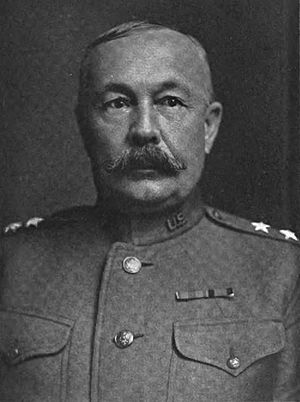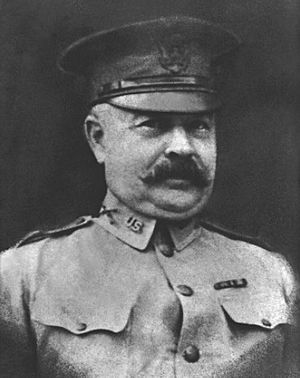John Frank Morrison facts for kids
Quick facts for kids
John F. Morrison
|
|
|---|---|

From Volume XXIII (1933) of The National Cyclopaedia of American Biography
|
|
| Born | December 20, 1857 Charlotteville, New York, U.S. |
| Died | October 22, 1932 (aged 74) Washington, D.C., U.S. |
| Place of burial | |
| Allegiance | |
| Service/ |
|
| Years of service | 1881–1921 |
| Rank | |
| Unit | U.S. Army Infantry Branch |
| Commands held | 6th Infantry Regiment 15th Infantry Regiment United States Forces in China Fort Oglethorpe, Georgia 30th Division 8th Division Western Department Camp Lewis, Washington Southeastern Department Fourth Corps Area |
| Battles/wars | Spanish–American War Philippine–American War Pancho Villa Expedition World War I |
| Awards | Army Distinguished Service Medal Silver Star |
| Spouse(s) | Kate L. McCleery (m. 1887–1929, her death) |
John Frank Morrison (born December 20, 1857 – died October 22, 1932) was a dedicated officer in the United States Army. He served in several important conflicts, including the Spanish–American War, the Philippine–American War, the Pancho Villa Expedition, and World War I. He rose to the high rank of major general and received special awards for his bravery, like the Army Distinguished Service Medal and the Silver Star.
Contents
Early Life and Education
John F. Morrison was born in Charlotteville, New York, on December 20, 1857. His father, John Morrison, was a county clerk. John F. Morrison went to Schoharie Academy and then attended the United States Military Academy, also known as West Point. He graduated in 1881 and became a second lieutenant in the Infantry.
Starting His Military Career
After graduating, Morrison joined the 20th Infantry Regiment. He served in different places like Fort Brown, Texas, and Fort Wallace, Kansas. In 1882, he moved to Fort Supply in what was then called Indian Territory. He also spent time at the Fort Leavenworth Military Prison in Kansas.
From 1883 to 1885, Morrison studied at the Fort Leavenworth Infantry and Cavalry School. After that, he worked on the frontier at Fort Assinniboine, Montana.
Between 1887 and 1893, Morrison taught military science at Kansas State Agricultural College in Kansas. During this time, he was promoted to first lieutenant in 1890. He also worked as a quartermaster for his regiment, which meant he was in charge of supplies. In 1898, he became a captain.
Wars and Important Service
The Spanish-American War
As a captain, Morrison joined the 20th Infantry Regiment again. They went to Mobile, Alabama to prepare for the Spanish–American War in Cuba. He served in Cuba throughout the war, including the Siege of Santiago. He was recognized for his bravery during the Battle of El Caney. Later, when the Silver Star medal was created, his earlier award was changed into this new medal.
Serving in the Philippines and Beyond
In 1899, Morrison's regiment went to the Philippines to fight in the Philippine–American War. He stayed there until 1904, continuing his role as a quartermaster for some of that time.
After his time in the Philippines, Morrison served as a military expert in Japan during the Russo-Japanese War in 1904. He then attended the United States Army War College, graduating in 1906. He was promoted to major in 1905.
From 1907 to 1911, Morrison was an instructor and later an assistant leader at the Army Staff College. He was promoted to lieutenant colonel in 1911.
Leading Regiments
Morrison served with the 20th Infantry at Vancouver Barracks, Washington. In 1914, he became a colonel and took command of the 6th Infantry Regiment. He led them on the border with Mexico during the Pancho Villa Expedition. In 1915, he was given command of the 15th Infantry Regiment in China. Soon after, he was promoted to brigadier general and became the commander of all United States Forces in China.
World War I Service
In May 1917, Morrison was promoted to major general. He was put in charge of Fort Oglethorpe, Georgia. He also commanded the 30th Division for a short time. From September to December 1917, he was a military observer in France during World War I. He then worked in Washington, D.C. as the Army's Director of Training.
From March to June 1918, Morrison commanded the 8th Division in California. From June 1918 to August 1919, he was in charge of the Army's Western Department, based in San Francisco. For his important work during the war, he received the Army Distinguished Service Medal.
Later Career and Retirement
After World War I, Morrison commanded Camp Lewis in Washington state from 1919 to 1920. He then became the commander of the Southeastern Department. He retired from the military in December 1921 when he reached the age of 64.
Morrison lived in Washington, D.C. after he retired. He passed away at Walter Reed Army Medical Center on October 22, 1932. He was buried at Arlington National Cemetery. He asked for a simple funeral, with only a bugler playing Taps.
His Family
On August 16, 1887, John F. Morrison married Kate L. McCleery. Her father was an Army chaplain. They were married until Kate's death in 1929. They did not have any children. Kate's sister, Margaret, was married to another important military leader, Major General Benjamin Alvord Jr..
Why He Was Important
John F. Morrison was highly respected as a teacher and trainer in the Army. He wrote books about military strategies, including Seventy Problems: Infantry Tactics, Battalion, Brigade and Division and Training Infantry.
His teaching skills at Fort Leavenworth were well-known throughout the Army. George Marshall, who later became a very famous general, said that Morrison "taught me all I had ever known of tactics." For many years, if an officer could say "I was a Morrison man," it meant they were very well-trained and respected by their peers.
In 1974, Morrison was honored by being added to the Fort Leavenworth Hall of Fame. This Hall of Fame celebrates Army members who made big contributions to the Army's history while serving at Fort Leavenworth. Also in 1974, the U.S. Army Command and General Staff College created the John F. Morrison Professor of Military History. A leading historian is chosen each year to hold this special teaching position.
 | Aaron Henry |
 | T. R. M. Howard |
 | Jesse Jackson |


